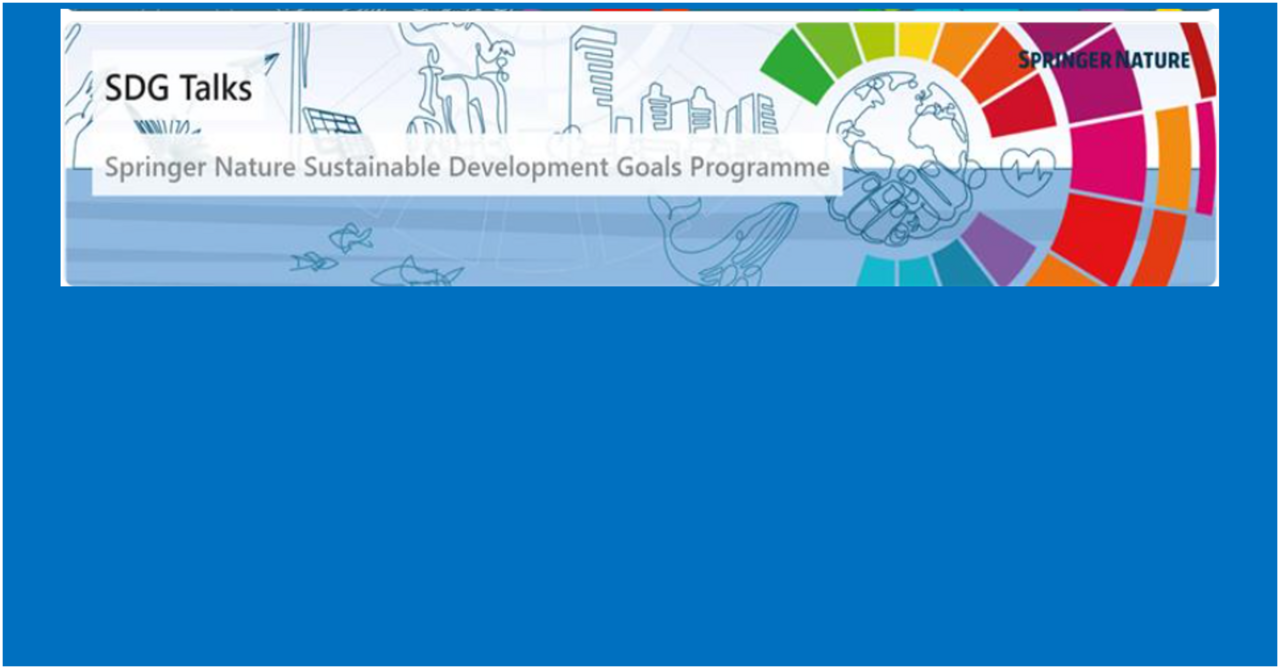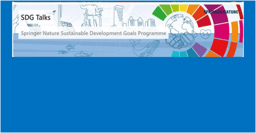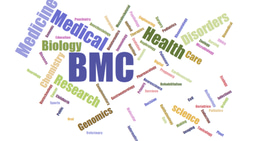Meet the speaker: Ebenezer Durojaye
Published in Sustainability and Public Health

Register here:
https://cassyni.com/events/2YqcuJT4SRgXEwASSbHrLD/abstract?cb=0.0wom
On September 10th, 2025, the SDG 5 working group will host a panel discussion on “Gender identity in Indigenous communities”. This event is part of the Springer Nature SDG Talk series, a forum for discussion within and beyond academia of issues, progress and opportunities relating to research in support of the UN Sustainable Development Goals.
Gender identity is a complex concept that sits at the intersection of cultural, social and historical constructions. It becomes even more multifaceted when considering the perspective of Indigenous communities, where the definition of gender has historically been more nuanced compared to the Western traditionally binary system. Many indigenous communities, for example, recognize the notion of a gender in between male and female or alternatively gender fluid.
In the forthcoming event we will delve into the challenges that Indigenous communities face in terms of social acceptance and legal recognition, exploring the ways Indigenous communities are working on to reclaim, preserve, or protect their gender identities despite colonial legacy, LGBTIQ+phobia and discrimination. Two speakers will join us in the conversation: Professor Courtney Ryder, an Aboriginal early career research and leader at Flinders University, and Professor Ebenezer Durojaye, Professor of Law and Acting Director of the Centre for Human Rights at the University of Pretoria. We had the privilege to talk to one of them ahead of the session.
Let’s meet Professor Ebenezer Durojaye.
Tell us a bit about yourself.
%20(002).jpg) I am currently a Professor of Law and the Acting Director of the Centre for Human Rights, University of Pretoria, South Africa. My research focuses on international human rights law including socio-economic rights with special attention to the right to health and sexual and reproductive health of vulnerable and marginalized groups such as women, children, persons with disabilities, indigenous populations and people from disadvantaged communities. Between 2012-2014, I provided technical support to the UN Special Rapporteur one extreme poverty. For about a decade I served as one of the independent experts of the African Commission’s HIV Committee.
I am currently a Professor of Law and the Acting Director of the Centre for Human Rights, University of Pretoria, South Africa. My research focuses on international human rights law including socio-economic rights with special attention to the right to health and sexual and reproductive health of vulnerable and marginalized groups such as women, children, persons with disabilities, indigenous populations and people from disadvantaged communities. Between 2012-2014, I provided technical support to the UN Special Rapporteur one extreme poverty. For about a decade I served as one of the independent experts of the African Commission’s HIV Committee.
How does your work relate to SDG5 and indigenous communities?
The overarching goal of the SDG is not to leave anyone behind. SDG 5 specifically relates to ensuring gender equality for all. My work has highlighted the lack of access to health care services, including sexual and reproductive health care services for vulnerable and marginalized groups, such as women, children, persons with disabilities, indigenous population and refugees and asylum seekers. I have consistently advocated for special measures to be adopted by states to address discriminatory practices in service delivery for these groups. In particular, I supported the end of discrimination in the enjoyment of the right to health for marginalized and vulnerable populations, including indigenous peoples. My research has identified the need for states to adopt remedial measures to address discriminatory practices in the context of healthcare services often experienced by indigenous peoples in Africa.
What does success in achieving the SDGs look like in your field of research?
In the area of right to health and reproductive health care services, much effort is needed for many of the African countries to meet some of the targets of the SDGs. SDGs 1, 3 and 5 remain very problematic and efforts at meeting these goals remain uneven and slow. Many African countries are still struggling in reducing the maternal mortality ratios to the percentage envisaged by SDG 3. And if this continues many African countries are unlikely to meet the target of reducing maternal mortality by 75 deaths to 100, 000 live births (target 3.1). While progress has been made to reduce the number of people in extreme poverty, the poverty level among vulnerable and marginalized groups such as women, persons with disabilities and indigenous peoples remains unacceptably high. While laws and policies have been made to address inequality and non-discrimination, gender inequality stubbornly persists and the gaps between the haves and have nots have widened.
Reflecting on your journey in this field, what obstacles have you encountered, and how do you envision the path forward toward meaningful solutions?
One of the biggest challenges militating against progress in achieving the SDGs has to do with lack of political will on the part of states. Many countries, particularly in Africa, are quick at making promises but are reluctant to fulfil these promises. Unless states show more commitment to addressing inequality or reducing maternal deaths through strong political will, we will be unable to reduce maternal deaths nor be able to narrow the gaps between the haves and haves not. In relation to efforts made at reducing the level of extreme poverty, sub-Saharan Africa has made the least progress. Governments of these countries need to redouble their efforts in addressing the high level of poverty. In some situation cultural practices have continued to exacerbate discriminatory practices that undermine the right of women and girls and make it difficult to address inequality. More importantly, vulnerable and marginalized groups such as women, children person with disabilities, people of different gender identities and indigenous peoples would need to be more involved in decision-making so that their voices are heard in the development of laws and policies.
The need for states to commit adequate resources to ensure universal access to healthcare services is imperative, especially in African countries where the resource allocation in health sector faces significant challenges. This is contrary to the Abuja Declaration, where African governments agreed to commit at least 15% of their annual budgetary allocation to the health sector. More than ever before this is the time for African governments to increase allocation to the health sectors to fulfil their promises made in Abuja in 2001. The healthcare sector in Africa is in a dire situation and unless adequate resources are allocated deaths from pregnancy or childbirth will continue unabated.
Follow the Topic
-
BMC Public Health

An open access, peer-reviewed journal that considers articles on the epidemiology of disease and the understanding of all aspects of public health.
Related Collections
With Collections, you can get published faster and increase your visibility.
Cancer in older adolescents and young adults
BMC Public Health is calling for submissions to our Collection on Cancer in older adolescents and young adults.
Cancer in older adolescents and young adults presents unique epidemiological challenges, with distinct patterns of incidence, risk factors and outcomes compared to other age groups. This Collection aims to enhance our understanding of cancers that affect these populations, such as gastrointestinal, endometrial, colorectal, cervical and breast cancers, some of which are HPV- or obesity-related. We invite research that explores disparities in cancer outcomes and advances evidence-based strategies for prevention, early detection, and management. For the purposes of this collection, we define older adolescents and young adults as being between 15 to 39 years old.
Topics of interest related to cancer in older adolescents and young adults include but are not limited to:
• Recent and longer-term trends in the incidence and mortality of different types of cancer
• Role of infectious, environmental, and lifestyle factors in cancer development
• Impact of obesity at age of diagnosis or prior obesity (such as during childhood) on subsequent cancer risk and outcomes
• Disparities in outcomes by race, ethnicity, and socioeconomic status
• Innovations in cancer prevention, screening, and early detection
• Long-term survivorship and quality of life among cancer survivors
• Policy implications for cancer prevention and control in younger populations
This collection supports and amplifies research related to SDG 3 Good Health & Well-Being.
All manuscripts submitted to this journal, including those submitted to collections and special issues, are assessed in line with our editorial policies and the journal’s peer review process. Reviewers and editors are required to declare competing interests and can be excluded from the peer review process if a competing interest exists.
Publishing Model: Open Access
Deadline: Jun 26, 2026
Endocrine disruption as a public health issue
BMC Public Health invites submissions to our new Collection, Endocrine disruption as a public health issue. Endocrine disruption has emerged as a growing public health challenge, characterized by the interference of certain chemicals with the normal functioning of the endocrine system. Endocrine disrupting chemicals (EDCs) can mimic, block, or alter hormone signaling, leading to a range of adverse health outcomes. Common sources of EDC exposure include everyday products such as plastics, pesticides, and personal care items, all of which can release substances like bisphenols and phthalates into the environment and human body. Understanding the links between exposure to EDCs and eventual health outcomes is vital for assessing their implications for population health.
We welcome submissions that delve into various aspects of endocrine disruption. Key topics of interest include, but are not limited to:
Role of EDCs in metabolic, endocrine and immune-related disorders
Effect of EDCs in consumer products including personal care products
The links between EDC exposure and male and female reproductive health problems
The links between EDC exposure and certain cancers
Insights into the long-term consequences of early-life EDC exposure and transgenerational effects
Methodological advances in assessing the health impacts of EDC mixtures and cumulative exposures
Development and application of statistical approaches to better estimate the health effects of chronic and/or concurrent exposure
Validating models of cumulative exposure with measurement of combinations of EDCs in human tissues
Individual- and policy-level interventions to address health impacts of EDC exposures
The search for substitutes lacking endocrine disrupting properties
All manuscripts submitted to this journal, including those submitted to collections and special issues, are assessed in line with our editorial policies and the journal’s peer review process. Reviewers and editors are required to declare competing interests and can be excluded from the peer review process if a competing interest exists.
Publishing Model: Open Access
Deadline: May 26, 2026


Please sign in or register for FREE
If you are a registered user on Research Communities by Springer Nature, please sign in